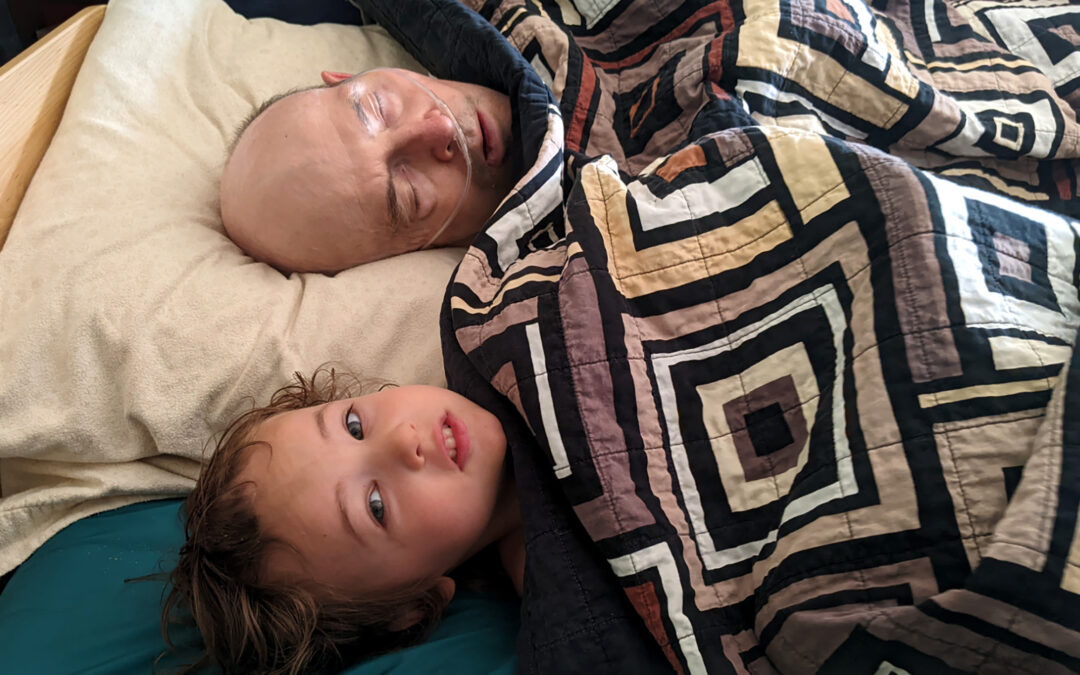Jan, Mark and Bronwyn Gisborne spent the past 7 years caring for Stan Gisborne, who had locked-in syndrome. An abridged version of this interview appears in the October 2023 issue of Zest. Here is the full interview with Mark.
In 2017, my father Stan Gisborne was admitted into St. Paul’s Hospital for open Heart Surgery to repair an aneurism that had developed. After what was initially considered to be a successful operation, the medical staff attempted to wake Stan up, only to discover that he had suffered complications while he was under the knife. Stan awoke with “locked in syndrome” due to restricted blood flow in his brain stem.
I (Mark Gisborne) immediately travelled to Vancouver to offer whatever assistance I could.
We devised a system to enable communication through only blinking. As a result of being the one capable of interpreting Stan’s blinking into words, I followed him through the system and learned many caregiving techniques that were unique to his very challenging needs.
Why did you choose to care for Stan at home?
As a family, we would hold team meetings to make decisions on Stan’s care plan. It was decided early on, that we would bring him home. The medical system was ill-equipped to handle the needs of someone in his condition.
Getting him home came with its own challenges as the house was old and not suited for someone with his mobility challenges. In a two-month window, we built a 24’x20’ addition onto the house, that was purpose built to meet Stan’s caregiving challenges.
What kind of care did he need in the beginning? How did that change over time?
Stan’s care needs were extensive and detailed. Every need you take for granted, needed to be provided by his caregivers. Outlining the tasks for his basic care needs was over five pages, and changed over the seven-year period that we cared for him at home. Initially our focus was on providing rehabilitation. Stan worked hard, and was eventually able to feed himself, speak, and even started to stand with the assistance of others. Unfortunalty COVID pulled the rug out from under us, and the decline of healthcare services resulted in Stan’s rehabilition/recovery to stall out and then regress.
Who was looking after him?
Stan was looked after by a team of caregivers. Some tasks were completed by different workers, while other tasks really benefited from consistency. Over time, my roll evolved into ensuring Stan had a good nights rest. Going down the checklist, and getting him positioned to reduce overnight discomfort, and repositioning in the middle of the night.
Did any of you have previous caregiving experience?
None of the immediate family had any previous caregiving experience that could translate to meeting Stan’s care needs. But we were quick to learn. Bronwyn, who later became my wife, was a yoga instructor and those skills were helpful.
What was a typical day like? How did you divide up the tasks?
A typical day would take up roughly 6 pages in point for. It was broken up into shifts and tasks.
A morning shift would take several hours, and involved getting Stan up and out of bed, into his chair and ready for the day. The afternoon would usually involve appointments, rehabilitation, and social interactions. Later into the evening, caregivers would work at getting Stan ready for bed, and transitioned into bed. After 10 pm, I would arrive to work the closing shift, 7 days a week, 365. This would give him a sense of comfort that his night would be consistent.
Did you get tired? Lonely? Frustrated?
I would get tired. I did not feel lonely as we had a team working together to meet Stan’s needs. We would often be frustrated by the bureaucracy and the road blocks placed by Vancouver Coastal Health.
The nurses, doctors and caregivers were amazing. But the system is extremely frustrating and did not seem to be designed to meet the needs of the client.
What spiritual / human lessons did you learn, over the course of your caregiving?
That the mental health of the patient is often overlooked by the current healthcare system. However, the mental health of the patient is often equal to, if not more important to the recovery and rehabilitation plan. That home is often the best place for a family member to return to. To return to what is familiar, to where they have planted their roots will result in better rest and recovery.
Additionally, the mental/emotional health of the caregiver is also important. While caregiving, the patient, and the caregiver will form a symbiotic connection, and the caregiver can unknowingly introduce joy and/or depression. That if you as a caregiver are unhappy, or are struggling, that sometimes the best thing to do, is to step back and step out of the room. Remove the negative energy, because the patient does not have that same ability.
That a caregiver needs to prioritize self care, as well as client care.
What’s different about the care you receive at home, rather than in an institution?
The care received at home does not have access to the same resources that a facility can access. However, a facility can often feel impersonal, and emotionally distant. Sleeping in an unfamiliar location can certainly have a detrimental effect of ones care, and can create a disconnect between the patient, and their family.
You need to think about what it would be like to have the condition the patient has. And often, being at home is the preferred option and choice. But if you do choose to receive care at home, you must also remember that if the caregivers are getting burned out, that if you do not feel you can provide safe and consistent care, that admission to the emergency room is always an option.
What kind of outside help did you get? Did you pay for it out of pocket?
We started with home support from VCH, this was later contracted out to a private home support provider. And even later still, we transitioned towards the CSIL program to receive some of the support that Stan required. These supports were insufficient to meet all of stan’s needs. The support of friends and family made Stan’s journey possible. We also spent a significant amount of money out of pocket to provide the services that were not provided by VCH. The two big ones were rehabilitation and physiotherapy. While it came with a cost, it made a difference in Stan’s health and improved his quality of life.
How did your relationship with Stan change, as you were caring for him?
My relationship with my father changed dramatically. In the transition from “son” to “caregiver,” our language and communication changed. I would refer to my father as “Stan”, or “the patient”. This was a reflection of change in our relationship. The care was complicated and detailed, and I needed to get my head “in the game,” step away from the tempest of emotions surrounding my father, our history, and everything else. Stay focused, stay calm, and do a good job. The love and appreciation between my father was often, “unspoken,” but apparent in our expressions, and our eyes. Family members need to be an advocate for their loved ones. When you are also the front line hands on caregiver, it gives you a perspective and understanding that is unmatched.
When did Stan pass away? How? Were you with him?
Stan passed away on July, 07, 2023. After a tough battle with pneumonia, that resulted in his hospitalization in June. He was treated with IV antibiotics as the bacteria had moved into his bloodstream. While he had recovered from that bout of sepsis, we as a family decided we would respect his wishes to keep him in the home, and not re-admit him into the hospital facility. The strain on his mental health was untenable, and he wanted to be with his family, in his home. In early July, the pneumonia came back, and we focused on making sure Stan was comfortable, and loved in his home until the end.
My job was always the night shift, and on the night of the 6th, I stayed up all night, and ensured he was comfortable as we knew he was approaching the end. In the early morning of the 7th, Stan Gisborne passed away in his sleep. After he passed, I turned off all the equipment, and opened the windows. And for the first time in a long time, his room was silent and still.
Looking back, do you have any regrets from this time?
Looking back, it was a challenging journey, and a tough road to travel. Hindsight is 20-20. But in order for me to run that marathon, and help Stan with what he needed I developed a routine.
When I would finish my shift at night, and get ready for bed. I would ask myself.
“Did I do the best I could, with what I knew at the time, within my ability”
The reason is that you will get knocked down, and you will run into barriers. You are running a marathon, and need to get back up and pace yourself.
Could I have done better knowing what I know now? Absolutely.
Do I have any regrets about the Journey that I traveled with my father? No.
The good comes with the bad.
Advice for other caregivers?
My advice for other caregivers is to do your best, and don’t give up. But first and foremost, is make sure you look after yourself. Getting burned out can result in 2 patients needing care, rather than one.
I would also like to add:
Part of the experience with looking after my father over the last 7.5 years, was the multi-generational living that we experienced. Stan was present for the birth of his granddaughter Marceline (home birth), an unforgettable experience that would not have happened in a facility. Stan lived with his family and his grandchildren. He would often go out on his farm to check on the fruit trees he had planted years ago, and provide advice on their care and harvest. While there are hard times, there are also moments that are unforgettable and difficult to describe the emotional impact.
Let me describe one such experience.
This occurred less than a week before Stan passed away, and his health was failing.
When I woke up, I found that Marceline (my four-year-old daughter), was not in her bed, or in her room.
After searching where she had gone, I found her in my father’s room.
She had gotten up early, and climbed into his bed.
It was one of those moments that made such a hard journey worth the efforts. An experience that I will never forget. A moment that just occurred naturally without any planning. Families naturally want to love and support each other, and when people are enabled to live in a multigeneral home, experiences like this can occur organically.







